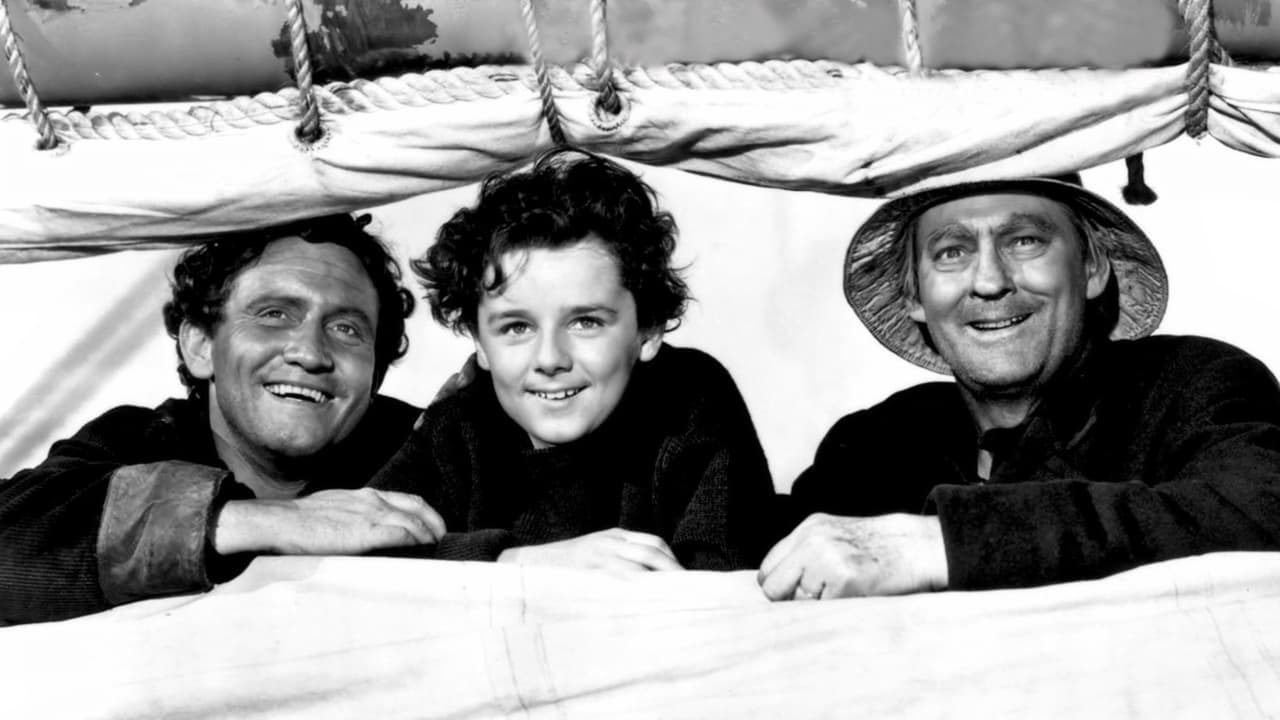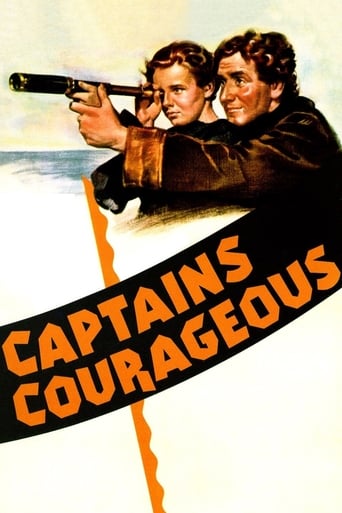

Spencer Tracy won his first of two back-to-back Oscars for playing a Portugese fisherman in this tear jerker from 1937.Tracy becomes a father figure to a spoiled brat rich kid (Freddie Bartholomew) when the kid falls overboard off an ocean liner and is picked up by the fishing trawler. Familiar actors like Lionel Barrymore, Mickey Rooney, and Charlie Grapewin play the other fishermen, and Bartholomew predictably learns the value of hard work and ethics from this merry band.While overall I thought "Captains Courageous" was a solid if unspectacular film, I was surprised by its treatment of the central theme (fatherhood) and its ending. Bartholomew is reunited with his absentee father (Melvyn Douglas), who learns the error of his ways and is determined to be more there for his kid. That I expected. But what I didn't expect was the unspoken but very obvious fact that the relationship between father and son was permanently stunted by the fact that the son found a father figure he liked better, that his true father understood that, and resigned himself to having the best relationship he could under those limitations. That's a pretty mature conclusion for a film from this time period, and one that certainly remains relevant today.Victor Fleming provides the direction, which was not among the four categories for which this film was Oscar-nominated. In addition to Tracy, the film won nominations for Best Picture, Best Screenplay, and Best Film Editing.Grade: B+
... View MoreWhile it is an occasionally spirited film dealing with fishermen and their vessels on the seas, I am struck by the film's emotional core, which are those scenes of remarkable intimacy between Spencer Tracy and Freddie Bartholomew. The two actors have a sublime rapport, assisted by the direction of Victor Fleming. Tracy won an Oscar, of course, for his touching, humane portrayal which mixes wisdom with humor and courage, as Manuel, a simple Portuguese fisherman who teaches a young boy about life and helps that formerly spoiled young man mature. Bartholomew, in the role of the rich man's son, gives what has to be the performance of his career.I'm always particularly touched by the scene towards the film's end in which Bartholomew tries, in his own way, to tell the fisherman of his love for him. And it really is a moment of love between these two. Tracy is talking to the boy about the fact that the boy's father will be anxiously looking for him and they will need to be reunited. Bartholmew acknowledges that statement, but starts to ramble. He keeps his head down, looking at the floor as he tries to tell Tracy how he feels. It's one of the most heart wrenching moments ever captured on film. A little boy, formerly self absorbed and proud, dropping all pretense of pride as he emotionally opens up to a man he loves and respects, and can't bear to leave. Tracy, stunned, deeply moved, can only say, "My leetle feesh," as he places his hand on the boy's face. His look and that gentle simple gesture beautifully expresses his feelings at the moment, too. It's a scene that never fails to move me.Later in the film, after the fisherman, the boy's friend and hero, has drowned, Bartholomew, in that scene in which he cries in Manuel's boat, as his father tries to comfort him, captures the anguish and despair that we all feel when we have lost someone very special in our lives, and know we will never see that person again. Victor Fleming touchingly directs a moment which, to me, captures the agony of a young boy dealing with the terrible permanence of death.
... View MoreIn its classic heyday, Hollywood made its own heroes. The source material for most classic pictures tended to be from theatre and literature, but the studios were savvy enough to tailor material not only to suit the medium but the resources available to them, without anyone crying "sacrilege!" It's not uncommon for a screen adaptation to cut out one character for the sake of length or beef up the role of another for commercial viability, but sometimes rearrangements need to be made for the sake of Hollywood form. The screenplay for Captains Courageous, whose writing team includes John Lee Mahin, a name on a ridiculous number of excellent MGM features, makes a number of massive changes to Rudyard Kipling's novel, surely the most significant of which is the foregrounding of Manuel to a major character. In the book, Manuel is simply another crew member and a relatively minor character, whereas in the film he becomes the very spirit of the story, and a surrogate father figure for young Harvey. It puts a powerful new emotional slant on the tale, but also puts the burden on the writers to build the character into someone who can carry the picture.This was the way Hollywood worked at the time. Its stars were characters, and its stories were built around powerful personas. Captains Courageous needed a Manuel. And Manuel needed a star who could breathe lungfuls of life into him. Spencer Tracy was perhaps an odd choice for a Portuguese fisherman – he was not one of those generic ethnic types like Mischa Auer or Akim Tamaroff who were cast as anything from Mediterraneans to Manchurians. But even this early in his career he had carved out a reputation for earthy, honest good guys, and this was indeed the very reputation Fritz Lang was trying to pervert as early as 1936 in Fury. And while Tracy can quite easily put on the "funny foreigner" act he never once loses sight of his character's emotional truth. He presents Manuel as a daffy caricature, and yet allows genuine tenderness, pride, grief or anger to shine through the stereotype – and that is the beauty of his performance.But the character of Manuel and his effective interpretation by Tracy cannot carry the picture alone. It's time to look at the contribution of director Victor Fleming. Fleming was himself a rugged outdoorsman who took a no-nonsense approach to film-making, which translated into excitement on the screen. Fleming pictures move, and they move quickly. Take the opening scenes on dry land. There is quite a lot to take on here – Freddie Bartholemew's character, his relationship with his father, and the sequence of events which lead him to be stranded in the Atlantic. Fleming packs it all into twenty minutes, and an engaging twenty minutes at that. How? First, the actors are coached to spit out their dialogue as quickly as is feasible. There is no room given to wordless contemplation, and there doesn't need to be at this point in the story either. Second, Fleming makes these scenes seem even faster than they really are. Characters walk as they talk, and shots often begin and end with movement, buffeting us from one point to the next.Even once we are underway on board the We're Here, motion is a continual presence. Crew members bustle about, sometimes getting between the camera and the protagonists, and everyone tends to keep working as they talk. This not only gives a realistic atmosphere to life aboard a busy fishing vessel, it gives a rough and relentless pace to the images. Just like young Harvey, we are being dragged along for the ride. Even in the more sedate scenes, such as Tracy playing his hurdy-gurdy on watch, Fleming keeps the sea sweeping up and down as a backdrop. After the furore that came before it's now quite a soothing presence, but we are never allowed a moment of total stillness, and when the story eventually gets back on dry land the difference is quite jarring.The crew of this fictional fishing boat are appropriately motley, with such distinguished hams as Lionel Barrymore, Charley Grapewin and John Carradine. Rather than harm the sincerity of the picture with their grandiosity, they actually fit in nicely as a bunch of salty dogs, and they stop Tracy's performance from looking farcical. At the very opposite end of the scale we have that fine naturalistic performer Melvyn Douglas, seeming appropriately muted for his role as the landlubber of the piece. Freddie Bartholemew was always a little too childish for his career to last into adulthood, but he does well here by simply reacting believably to those around him. By contrast, Mickey Rooney was always destined to be a star for life, because he never dwelled on being the child star, and was always an actor first and foremost. A final honourable mention goes to Sam McDaniel as Doc. He is the lesser-known brother of Hattie McDaniel, and although his career was very prolific this is one of his few credited appearances.I do not know whether there were significant numbers of Kipling purists around at the time, lamenting the swathe of differences between this version and the novel, but certainly now there are a lot of people who will criticise a film for not being the book. But what good would it do the book if they got their way? Surely it would make the novel truly redundant if motion pictures were just slavish copies of the printed word. This Captains Courageous has its own identity and is a classic of the screen. This does not mean it has ruined the legacy of what is an equally classic book.
... View MoreWith Captains Courageous director Victor Fleming and his scenarists pull off a nail-biting high seas adventure laced with powerful emotions. This adaptation of a Kipling story begins psychologically and on land as we are introduced to a nasty, spoiled, rich kid (Freddie Bartholomew) who uses his social standing to get whatever he wants. When he goes too far and gets suspended from school, his neglectful and over-indulgent father (Melvyn Douglas) decides to take him on a trans-Atlantic voyage to reconnect and bring his offspring into line. However, after showing off to some other kids by buying and drinking five chocolate sodas, the queasy boy falls overboard. He is scooped out of the water by a Portuguese fisherman named Manuel (Spencer Tracy) and deposited on a fishing trawler captained by crusty Lionel Barrymore and a seasoned crew. There, predictably, the tough seafarers knock him down to size and force him to grow up. Although Tracy won an Oscar for his portrayal of the saintly Manuel, equally impressive is 10-year-old Freddie Bartholomew in his evolution from a clever but destructive and insensitive little brat to a responsible, productive young man, all the while gradually bonding with Tracy whom he comes to regard as a father figure. The film seesaws from high action, with the crew struggling to harvest the bounty of the pitiless ocean in competition with rival trawlers, to intimate drama as Bartholomew slowly and painfully learns that the world does not revolve around him and his immediate needs. The production itself holds up very well. The viewer's nose is rubbed into the slime and grime of primitive fish processing in several sequences that also serve to put us into the child's position, thereby strengthening the impact of his ordeal in our imaginations. Close shots of shipboard life are seamlessly intercut with long shots of actual vessels on the open sea. Among the supporting players, it is a pleasure to report that Mickey Rooney and John Carradine actually get to play regular guys instead of the "types" usually assigned to them.It is the combination of the deep and timeless emotions connected with the parent-child relationship and old-fashioned adventure skillfully presented that make this one a classic.
... View More